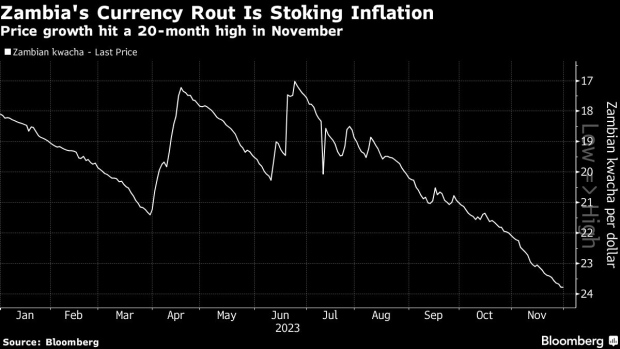Zambian inflation hits 20-month high as currency at record low
Food inflation quickened to 13.7% in November from 13.6% last month. Non-food price growth leapt to 11.8% from 11.3% in October. Inflation data is collected during the first 10 days of every month.
- Advertisement -
Zambian inflation accelerated to a 20-month high in November as a slump in the value of the kwacha raised the cost of imported goods like cereals, vehicles and spare parts.
Consumer prices rose 12.9% from a year earlier, compared with 12.6% in October, Statistician-General Mulenga Musepa told reporters in Lusaka, the capital, on Thursday. That was the highest inflation rate since March 2022. Costs rose 0.9% in the month.
- Advertisement -
The kwacha has depreciated by more than a fifth since July because of dollar shortages caused in part by lower copper production, its main foreign-exchange earner, weaker metal prices and issues with debt talks. Last week, official creditors co-led by China and France rejected a revised bondholder restructuring deal, stalling the revamp of $3 billion of outstanding notes. The country has been seeking to rework its debt since 2020 when it became Africa’s first pandemic-era sovereign defaulter.
- Advertisement -
Steps taken by the central bank over the past week to halt the currency slide — including increasing interest rates by 100 basis points to 11% and raising the reserve-ratio requirements for lenders to 17% from 14.5% — have done little to reverse the slump.
- Advertisement -
Read More: Zambia Hikes Rate by Most in Four Years to Halt Currency Plunge
Sustained weakness may again persuade it to lift interest rates next year.
Food inflation quickened to 13.7% in November from 13.6% last month. Non-food price growth leapt to 11.8% from 11.3% in October. Inflation data is collected during the first 10 days of every month.
Source:norvanreports
- Advertisement -


